In the past decade, the way businesses market to their customers has undergone a massive transformation, thanks largely to the rise of mobile technology. This shift is especially evident in Africa, where mobile phones have become more than just communication tools—they’re the primary gateway to the internet. As more Africans access the digital world through their smartphones, mobile-first marketing has become a vital strategy for businesses across the continent.
In this blog, we’ll explore the factors driving the rise of mobile-first marketing in Africa, the benefits it offers to African businesses, and how companies can harness this growing trend to stay competitive and thrive.
The Growth of Mobile Penetration in Africa
Africa’s mobile phone adoption is experiencing exponential growth. According to statistica, the mobile penetration rate in Sub-Saharan Africa was reported as 46 percent by 2021, having risen significantly since 2012. Further growth is expected for 2025, when it is expected that half of the Sub-Saharan African population will subscribe to a mobile service.
Why is this significant? For many Africans, mobile phones are the primary—often the only—means of accessing the internet. With the continent’s fixed broadband infrastructure lagging behind, mobile networks have become the backbone of internet access. This presents businesses with a unique opportunity: by prioritizing mobile-first marketing strategies, they can reach a far wider audience than ever before.
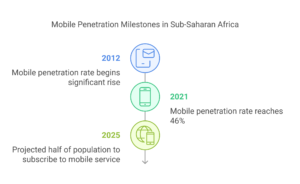
The Advantages of Mobile-First Marketing for African Businesses
So, what exactly is mobile-first marketing, and why does it matter for African businesses? Simply put, mobile-first marketing involves designing and optimizing marketing efforts specifically for mobile devices. This includes mobile-friendly websites, apps, SMS campaigns, and social media content that work seamlessly on smartphones.
For African businesses, adopting a mobile-first approach offers several key advantages:
1. Broader Reach
Given that the majority of Africans access the internet via mobile phones, optimizing marketing strategies for these devices ensures that businesses can engage the largest possible audience. By creating mobile-friendly websites and content, businesses can attract more customers and offer them an improved experience.
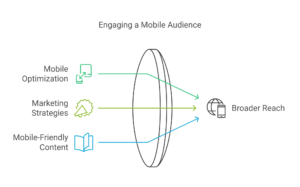
2. Cost-Effectiveness
Compared to traditional advertising methods like billboards and TV ads, mobile marketing is highly cost-effective. Social media ads, SMS campaigns, and even mobile app promotions allow businesses to reach their target audience without needing a massive marketing budget. For small and medium-sized enterprises (SMEs), this is particularly beneficial.
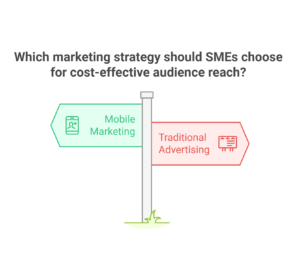
3. Personalized Marketing
According to Mediatool, More than 50% of consumers are interested in personalized recommendations when they shop online. They’re happy to exchange personal data for a tailored experience if they save time, get a discount, or find the right product.
Mobile devices offer businesses the ability to create personalized marketing campaigns. Through mobile apps, push notifications, or SMS, businesses can tailor messages based on users’ locations, purchasing behavior, and interests. Personalization improves engagement and drives higher conversion rates.
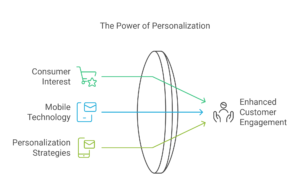
4. Mobile Payments
Mobile money platforms have significantly reshaped Africa’s economic landscape, enabling seamless financial transactions and providing businesses with enhanced opportunities to convert leads into sales. In August 2023, Mastercard announced a $5.2 billion deal to acquire a minority stake of up to 30% in the fintech business of South Africa’s MTN Group, aiming to capitalize on Africa’s expanding mobile money sector. This follows Visa’s 2022 commitment to invest $1 billion in Africa to advance digital payment solutions. Both investments reflect the massive growth of mobile money in Africa, where nearly 435 million people are expected to engage in online spending in 2024, driven by mobile payments for shopping, education, and entertainment. This growth has been particularly strong in areas previously underserved by traditional banking systems.
Mobile money platforms like M-Pesa, MTN Mobile Money, and Airtel Money have revolutionized how transactions are carried out across Africa. Kenya’s M-Pesa, which was launched in 2007, is widely considered to be the pioneer of digital wallet in Africa. Since then, the sector has grown rapidly, with over 500 million registered mobile money accounts across the continent. several successful providers, including Nigeria’s Paga, Tanzania’s Tigo Pesa, and Uganda’s MTN Mobile Money. According to the GSM Association, mobile money transactions in Africa are expected to reach $540 billion by 2025, up from $456 billion in 2020.
These platforms enable businesses to accept payments from customers using mobile phones, even in regions where traditional banking infrastructure is underdeveloped. This accessibility is a game changer for small and medium-sized enterprises (SMEs) and has contributed to the rapid growth of e-commerce across the continent.
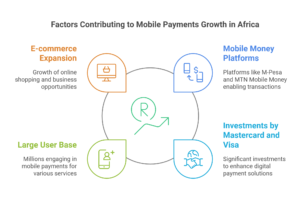
Case Studies: Mobile-First Marketing Success Stories
Several African businesses have successfully adopted mobile-first strategies, seeing significant benefits in the process. Here are a few examples:
Jumia
Jumia, Africa’s largest e-commerce platform, has consistently focused on mobile users, as they make up over 70% of the site’s traffic. By investing in a mobile-friendly platform and offering deals specifically targeted to mobile users, Jumia has been able to dominate Africa’s e-commerce space.
MTN and Airtel
MTN and Airtel have successfully implemented mobile-first strategies to offer value-added services such as mobile banking and personalized marketing, which have significantly boosted their user engagement and revenue.
MTN, for instance, has seen remarkable growth with its mobile money platform, MoMo. As of 2022, MTN had 69 million active MoMo users across Africa, with a projected goal of reaching 100 million by 2025. The platform processed 13.4 billion transactions in 2022, valued at $221 billion, showcasing the substantial financial inclusion MTN has facilitated.
In April 2022, Airtel received two key licenses from the Central Bank of Nigeria (CBN) that enabled it to expand its mobile money operations. First, SmartCash Payment Service Bank (PSB) received approval to offer full mobile money services, and second, Airtel Mobile Commerce Nigeria Ltd was awarded a super-agent license. This allowed Airtel to establish a network of agents capable of servicing customers of licensed banks and mobile money operators in Nigeria. SmartCash was initially launched in Lagos and later expanded nationwide. Airtel has invested heavily in IT infrastructure and security to ensure data privacy and expand access to financial services, particularly for underserved communities across the country.
Mobile Marketing Channels African Businesses Should Leverage
There are several mobile marketing channels that African businesses can utilize to effectively reach their target audience:
Social Media
With platforms like Facebook, WhatsApp, Instagram, and TikTok enjoying widespread usage across Africa, social media is a goldmine for businesses aiming to engage customers. In 2017, Facebook reported having 170 million users in Africa, meaning seven out of every ten Africans on the internet log into Facebook. With such deep penetration, mobile-optimized ads, interactive stories, and influencer marketing can significantly enhance brand visibility and allow businesses to directly connect with their audience on these platforms.
SMS & USSD Marketing
While smartphone use is growing, many African consumers still use feature phones. SMS and USSD marketing remain critical for reaching these customers, particularly in regions with less access to high-speed internet. Simple yet effective, these methods allow businesses to deliver promotions, alerts, and service updates directly to their audience.
Mobile Apps
Developing a mobile app can be a powerful way to foster customer loyalty. African businesses can create apps that offer discounts, loyalty rewards, and personalized content, helping to keep customers engaged while providing a seamless shopping experience.
Mobile Video Ads
With mobile video consumption on the rise, platforms like YouTube and TikTok offer businesses a strong opportunity to leverage mobile video ads. TikTok, the second most used social media platform, has a 60% active user rate. The platform is primarily used for short-form videos, with 73% of users sharing and watching this content. Furthermore, 72% of users turn to TikTok for entertainment, and 61% use it to discover new skills and life hacks, making it a versatile tool for both engagement and education. (Short, captivating videos tailored for mobile can significantly enhance brand recognition and customer engagement.
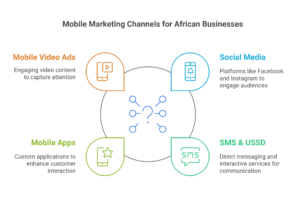
Challenges and Solutions for African Businesses
Despite the promise of mobile-first marketing, African businesses face certain challenges in fully capitalizing on this trend. However, with creative solutions, these barriers can be overcome.
Limited Connectivity
As Africa emerges as a key player in the global tech landscape, the lack of reliable and affordable internet access remains a significant challenge. Despite rising mobile penetration, large parts of the continent still suffer from limited connectivity, especially in rural and underserved areas. This connectivity gap hampers the ability to unlock Africa’s vast potential in the digital economy, creating an urgent need for businesses to adapt.
High Data Costs
The cost of mobile data remains a barrier for many African consumers. Businesses can address this by partnering with telecom providers to offer data-free browsing or by developing mobile apps that require minimal data usage.
Language Diversity
Africa is home to thousands of languages, which can pose a challenge for businesses looking to connect with diverse audiences. However, by adapting their marketing materials into local languages and dialects, businesses can resonate more deeply with their target customers and expand their reach.
The Future of Mobile-First Marketing in Africa
The future of mobile-first marketing in Africa is set for remarkable growth as 5G technology becomes more prevalent. By 2025, several African countries, including South Africa, Kenya, and Nigeria, are expected to have widespread 5G adoption, with over 340 million 5G connections anticipated by the end of the decade. This will enable businesses to create richer and more immersive mobile experiences, such as augmented reality (AR) and virtual reality (VR) marketing, helping companies offer more interactive content to users across the continent.

Additionally, the continued growth of e-commerce and mobile payments will make it even easier for African businesses to convert mobile users into paying customers.
Mobile-first marketing is no longer an option for African businesses—it’s a necessity. With more Africans accessing the internet through mobile devices, businesses that prioritize mobile-friendly strategies will be best positioned to thrive in an increasingly digital economy. Whether through social media ads, SMS campaigns, or mobile apps, there are countless opportunities for businesses to engage with their customers, drive sales, and build brand loyalty.
By embracing mobile-first marketing, African businesses can not only stay competitive but also unlock new levels of growth and success in the digital age.




